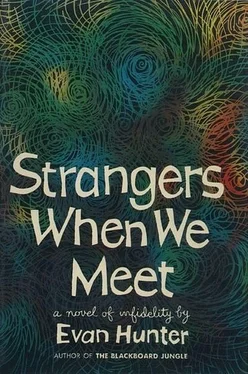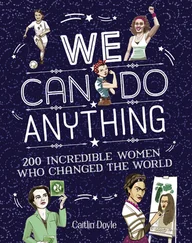EVE
You are truly Eve .
I mean...
Had you never been ,
Had I never seen
Your face or known
Your grace, there would
For me
Be no eve .
No eve of things
To come unended ,
No eve of splendid
Things to come
For us together
Forever .
You are truly Eve .
I mean ...
The eve of wonder
And surprise
Is in your eyes .
You are my eve,
And, Eve, I love you .
Quite suddenly, her eyes brimmed with tears.
She ran to the telephone to call him, and over Linda’s merciless pounding she told him she loved him and that he was foolish to write a poem but that she loved the poem and she loved him — but even then she didn’t know if she believed her own words.
Eventually, she went to bed with him. She waited until they were engaged because engagement seemed to condone intimacy, but actually it came naturally, the way everything in their relationship seemed to come naturally, unforced. Their marriage came the same way.
And on their wedding day, she sat alongside Larry on their way to Atlantic City, and she looked at him for the first time in a long time, really looked at him the way she might have looked at a stranger. They had bought at least a dozen magazines before boarding the train, and Larry began thumbing through them at once, surprisingly conversationless. She looked at him and realized with a start that she had married this man, that she was his wife, that she would live with him forever, that they had exchanged absurd vows, that they had entered an ironbound contract, and she didn’t even like his looks!
She nearly panicked.
She did not want to be going on a honeymoon. She did not want to wake up in the morning to find him beside her. She had been to bed with him spasmodically for perhaps six months, but she suddenly felt like a terrified virgin, suddenly felt she would be horrified by the sight of him in his pajamas brushing his teeth. Or did he sleep in his underwear? Good Lord, suppose he slept in his underwear?
She glanced down at the magazine in his hands. He was still reading a paragraph he’d begun a half hour ago, the lead to an article titled “Have You Chosen a Burial Plot?” She began chuckling silently, her fear evaporating. It would be all right. This was Larry, and he was just as frightened as she. It would be all right. She touched his sleeve, and he turned to her and smiled, and she returned the smile gently.
She did not really fall in love with Larry Cole until after Chris was born. She supposed she had loved him all this while, but now she fell hopelessly in love with her own husband. She felt somehow ridiculous. She was a wife and a mother now, and it was a little late to be getting foolishly romantic. But it was then that her love flowered, and then that her true relationship with him began.
Now, eight years after they had taken the marriage vows, five years after Chris had been born, she sat alone in the living room and thought of how empty the house seemed without him. She wanted him to be there. She wanted to neck with him, no sex, just necking, the way they’d exchanged kisses when she was still a college girl and he was a student at Pratt. Romance had a way of going out of living. And one day you probably woke up as an old old lady who thought back to the days when necking was fun, when a kiss was the most exciting thing in the world.
What had Mrs. Garandi been trying to say?
She knew, but she would not accept the thought. She suddenly wanted to call Larry, tell him to come home early so that she could neck with him. She went into the bedroom, looked up Altar’s number, and dialed it. Then, while the phone began ringing on the other end, she slammed down the receiver.
Why, he’ll think I’m checking on him! she thought.
But why should I be checking, what is there to check? I trust him, I trust him.
She began trembling. She did not want to be alone in the house. The house was too still and too empty. She put on her coat, and then went across the street to the Garandis, hoping Larry would come back from his visit with Altar early.
There was an eagle in the sketches. A wild, soaring eagle.
Altar studied them, and he felt the excitement of creation, and then he felt wild elation, and then a new surge of excitement as he shared vicariously in the creation. This was a house! This was really a house!
“Is it good?” the girl with him asked.
“Baby, go wash your face or something,” he told her.
“I only asked a question.”
“It’s magnificent!” he said, and he scooped up the sketches and went into his study and began dialing Larry’s home number.
He wanted to tell Larry that this was it. He wanted to tell him he appreciated this, shared it, that it made him feel like doing something, like running, like flying! He wanted to tell Larry he was a craftsman, and an artist, and a creator, and he wanted to tell him to hold onto whatever he had, hold onto it tight because it was a rare thing. He wished Larry were there so that he could clasp his hand and slam him on the back and buy him a drink and laugh with him and sing with him because he had it, by God he had it!
The phone kept ringing.
Altar waited impatiently. He let the phone ring for a long while, and then he hung up.
Eve, across the street at the Garandis, ate Arthur’s cake and drank Mary’s coffee, and listened to the Signora tell a story about the old country. Altar’s call woke up David, who sat in his wet pajamas in his crib and blinked at the darkness. But that was all it did.
And even David fell asleep again when the phone stopped ringing.
The builder’s name was Frank Di Labbia.
“I’m Italian,” he said, “and proud of it,” and Roger Altar instantly doubted his pride.
They sat in the rustic dining room of the rustic, exurban inn, the timbers exposed in the old ceiling, the stone fireplace crackling with a roaring fire, the Revolutionary War relics scattered about the room: the huge black kettles, the butter churns, the foot warmers, the pewter candlesticks. The planks in the floor were wide and hand-pegged, polished with Butcher’s wax so that they gleamed as they never had for General Washington. There was a gray wintry afternoon pushing at the leaded casements, and there were lighted candles on each table adding to the cherry glow of the fire. Carefully coifed, carefully windblown women in leather car coats sat over their luncheon salads and sipped vodka martinis. Outside the rustic inn, the foreign cars and the American cars mingled in allied camaraderie: the MG’s and the Corvettes and the Volkswagens and the station wagons with heavy-duty snow tires.
The builder was tall and dark and wide-shouldered and handsome in an outdoor, windburned way. Thick black hair rose wildly from a well-defined widow’s peak on his high forehead. He wore a bulky, expensive woolen sports shirt open at the throat, and a cashmere sports jacket with leather elbow patches, and dark gray flannel slacks imported from England and purchased on Madison Avenue. His face was a strong face, square with a black mustache on the upper lip.
His eyes were bright and brown, and his hands were thick builder’s hands curling with thick builder’s hair, but the fingernails were manicured. Altar studied him and wondered whom he was playing. He decided it was a young Clark Gable in an old movie. He even had Gable’s trick of quirking mouth and eyebrows simultaneously, as if he were secretly amused by a cosmic joke too rarefied for the rat pack to appreciate.
There was the pleasant hum of alcohol-stimulated luncheon chatter behind Di Labbia, the pleasant, pretty hum of pleasant, pretty women sitting in leather car coats sipping tasteless vodka martinis, their pretty, manicured fingers curled around frosted glasses in which lemon peel bow ties floated. Di Labbia’s voice, firmly assertive with a frank Connecticut twang, cut through the hum like an All-American fullback going for twenty yards against the freshman team.
Читать дальше












